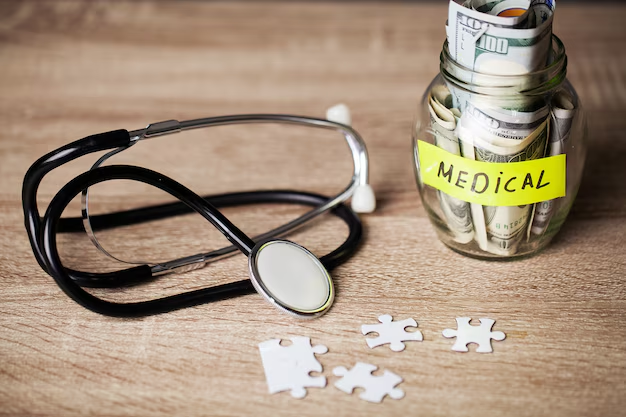Navigating Medical Debt: What Happens if You Don’t Pay?
Medical bills can be daunting, hanging over individuals like an unpaid notice in the back of their minds. Unfortunately, many find themselves in a sticky financial situation regarding healthcare costs, struggling to keep up with payments. But what exactly happens if you don’t pay medical debt? Understanding this can help demystify the process and empower individuals to take the right steps forward.
Understanding Medical Debt
Medical debt arises when individuals cannot pay for healthcare services rendered. Unlike other debts, it often results from unplanned emergencies or necessary care, which leaves little choice for the patient. Before we delve into the consequences of not paying, it’s essential to grasp why medical debt is so prevalent and its unique characteristics.
Why Medical Debt is Common
Several factors account for the prevalence of medical debt:
- Unpredictable Costs: Unlike buying a car or house, patients rarely know the total cost of services until after treatment.
- Gaps in Insurance: Even those with insurance may face high deductibles or uncovered expenses.
- Emergencies: Health emergencies often require immediate attention, bypassing cost considerations.
- System Complexities: Patients often find it challenging to navigate billing systems and negotiate costs.
Differences from Other Debts
Medical debt holds certain distinctions:
- Interest and Collection Practices: Typically, medical debt does not accrue interest in the way credit card debt might. However, once with a collection agency, interest or fees could be added.
- Potential for Negotiation: There is often more room for negotiation or payment plan arrangements with healthcare providers.
- Impact on Credit Score: Medical debts now have specific rules regarding their impact on credit, discussed later on.
Consequences of Unpaid Medical Bills
Unpaid medical bills can lead to several adverse effects. It is critical to be aware of these risks to make informed financial decisions.
Impact on Credit Score
Recent changes in credit reporting practices have altered how medical debt affects credit scores. Generally, medical debts will not immediately appear on credit reports, allowing a six-month grace period. However, if left unpaid, they can later impact your creditworthiness, making it more difficult to secure loans or favorable interest rates.
Collection Agencies
After several months of non-payment, medical providers often turn debts over to collection agencies. This transition comes with persistent reminders and notifications that can be stressful. Take note that:
- Healthcare Providers: Typically, wait 180 days before sending bills to collections.
- Collection Agencies: May report debts to credit bureaus after the waiting period, potentially impacting credit scores.
Legal Consequences
Ignoring medical debts can lead to potential legal actions, such as:
- Lawsuits: Creditors may file a lawsuit to recover owed amounts, leading to additional court costs or garnished wages.
- Judgments: A court judgment can allow creditors to seize bank accounts or place liens on property.
Emotional and Mental Stress
Beyond the financial implications, medical debt often contributes to significant emotional stress. Constant reminders about unpaid bills can cause anxiety, strain mental health, and impact overall well-being.
Navigating Options and Avoiding Consequences
Fortunately, there are various steps individuals can take when facing medical debts.
Communicating with Healthcare Providers
Proactive communication is key:
- Negotiate Bills: Contact healthcare providers to negotiate billing amounts or correct any errors.
- Payment Plans: Inquire about interest-free payment plans to spread costs over manageable installments.
- Charity Care Programs: Some hospitals offer financial assistance programs based on income and family size.
Exploring Financial Aid
Many patients qualify for assistance; consider these avenues:
- Government Programs: Medicaid or CHIP might provide retroactive coverage for qualifying low-income individuals.
- Nonprofits and Charities: Various organizations assist with medical bills, especially for specific conditions or treatments.
Legal Protections
Several consumer protection laws exist to shield people from aggressive collection practices:
- Fair Debt Collection Practices Act (FDCPA): Restricts unethical collection behaviors, such as harassment.
- State-Specific Laws: Some states have stringent regulations concerning medical debt collection.
Considering Debt Consolidation or Settlement
In some cases, consolidating debts or negotiating settlements with creditors might be favorable. However, it’s essential to consider all terms and potential impacts on credit scores carefully.
Key Takeaways for Managing Medical Debt
To effectively manage or mitigate the impact of medical debt, consider these practical strategies:
📝 Immediate Action: Don’t delay! Address bills promptly to avoid compounding issues.
📞 Communication is Key: Regularly contact healthcare providers for negotiations or error corrections.
💬 Understand Legal Rights: Know your rights under laws like the FDCPA to prevent unethical practices.
📈 Monitor Credit Reports: Regularly check credit reports for inaccuracies or unauthorized debts.
💡 Financial Assistance: Explore available charity care programs or government aid.
🔍 Professional Guidance: Consider financial counseling to navigate complex debt situations effectively.
Visual Summary: Medical Debt Overview
| Actions | Outcomes | Notes |
|---|---|---|
| Not Paying Debt | Lowers credit scores, collections agencies contact, possible lawsuits | Takes about 6 months before hitting credit |
| Negotiating/Billing Plans | Easier payments, reduced anxiety | Many providers open to negotiation |
| Financial Aid | Reduced or zero bills | Based on qualifying criteria |
| Legal Protections | Stops harassment | Know state-specific regulations |
Understanding the repercussions of unpaid medical debt and the options available can make a world of difference in handling this challenge efficiently. Patience, proactive communication, and leveraging available resources can turn a seemingly insurmountable financial burden into a manageable situation.

Related Topics
- Am I Responsible For My Spouse's Medical Debt
- Am I Responsible For My Spouse's Medical Debt After Death
- Can Medical Debt Affect Credit
- Can Medical Debt Affect Your Credit
- Can Medical Debt Affect Your Credit Score
- Can Medical Debt Be Sent To Collections
- Can Medical Debt Garnish Wages
- Can Medical Debt Go On Your Credit Report
- Can Medical Debt Go To Collections
- Can Medical Debt Hurt Your Credit
